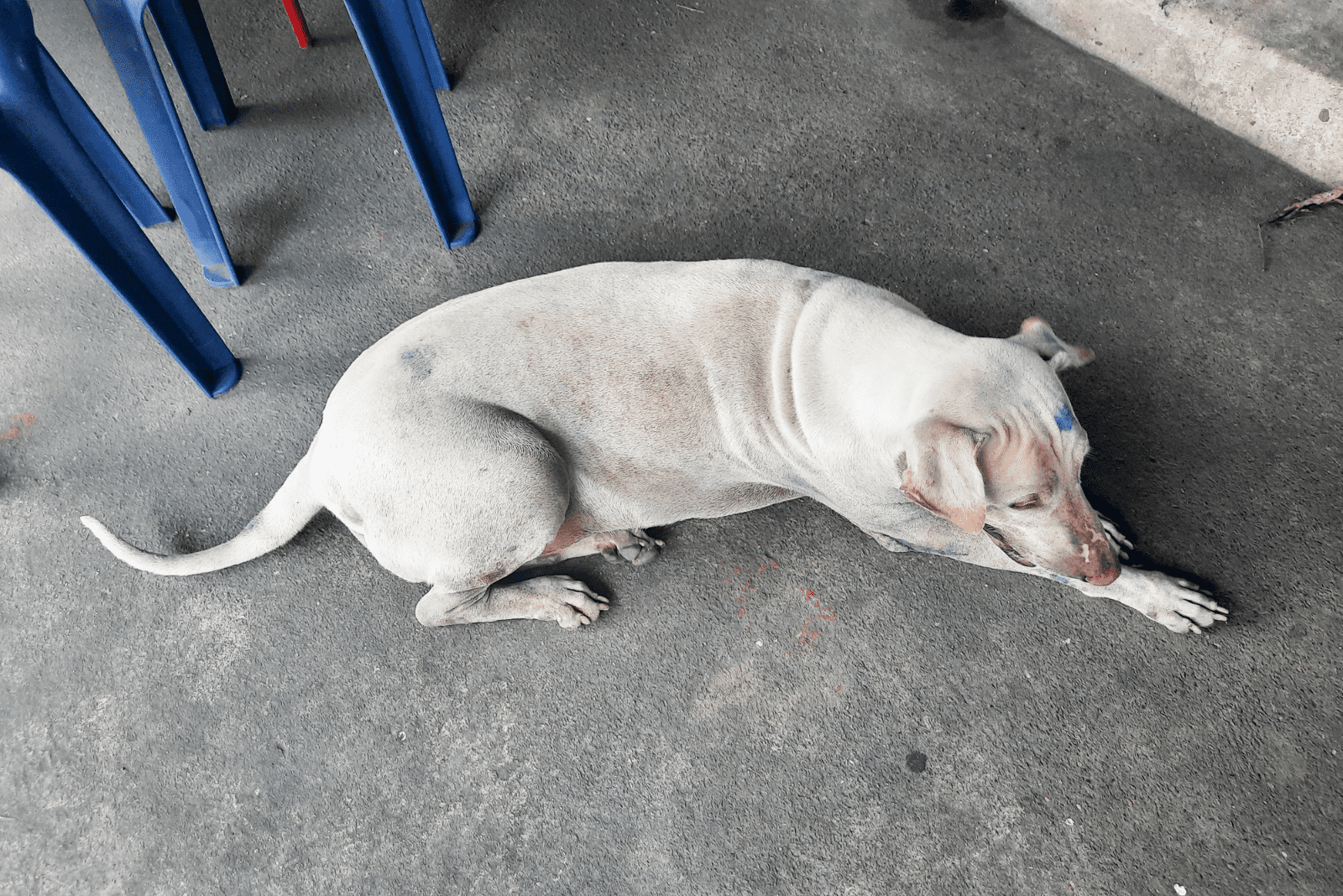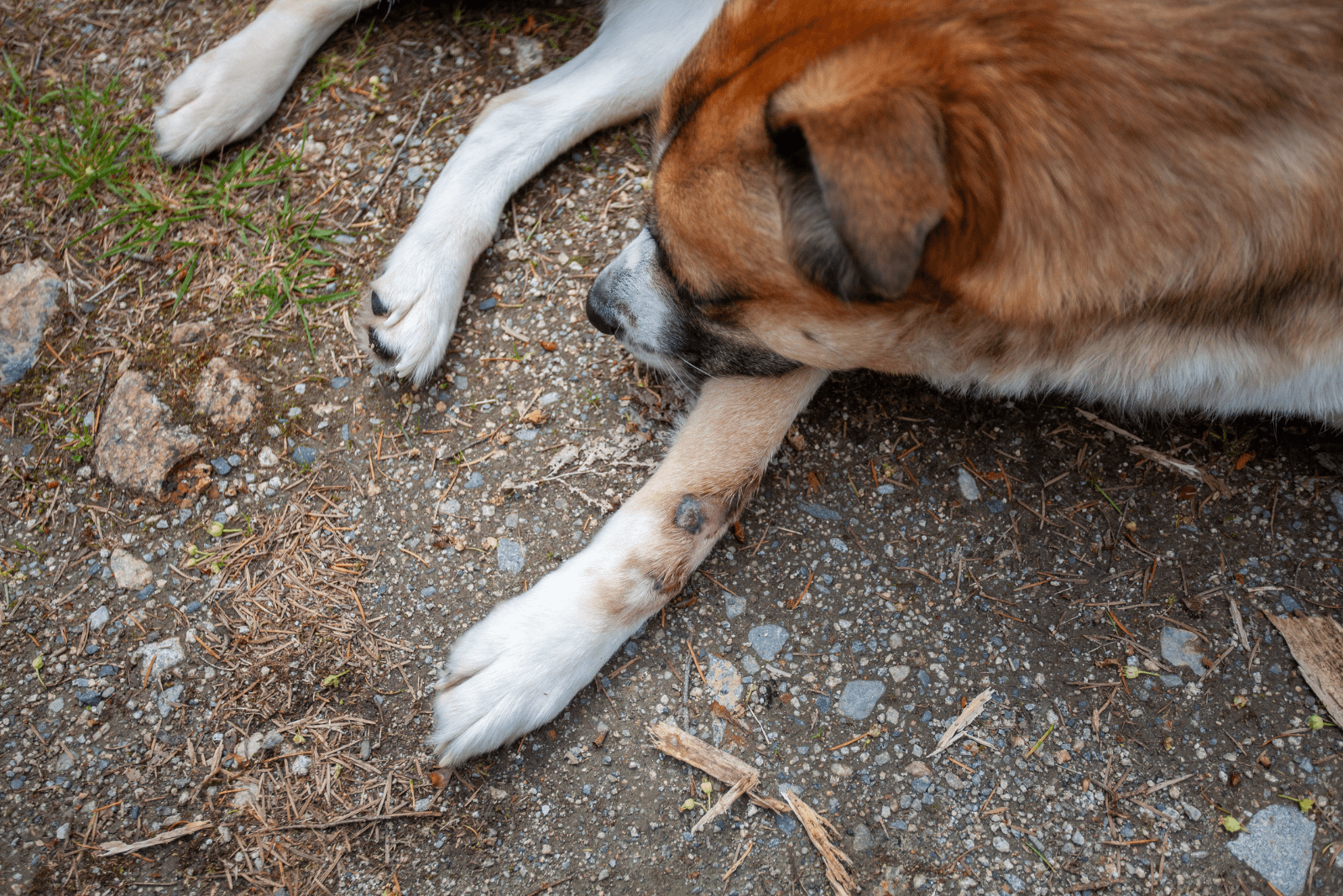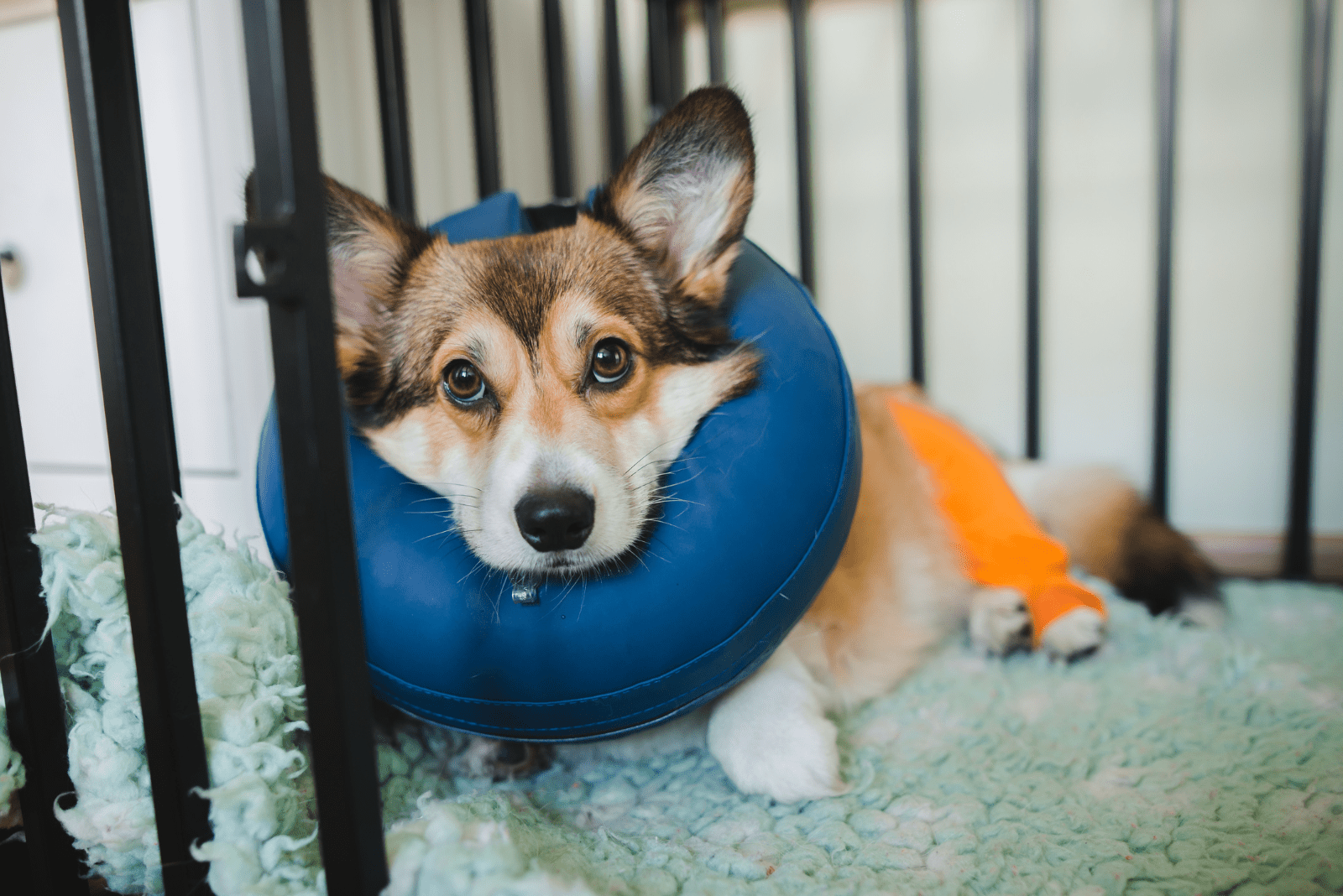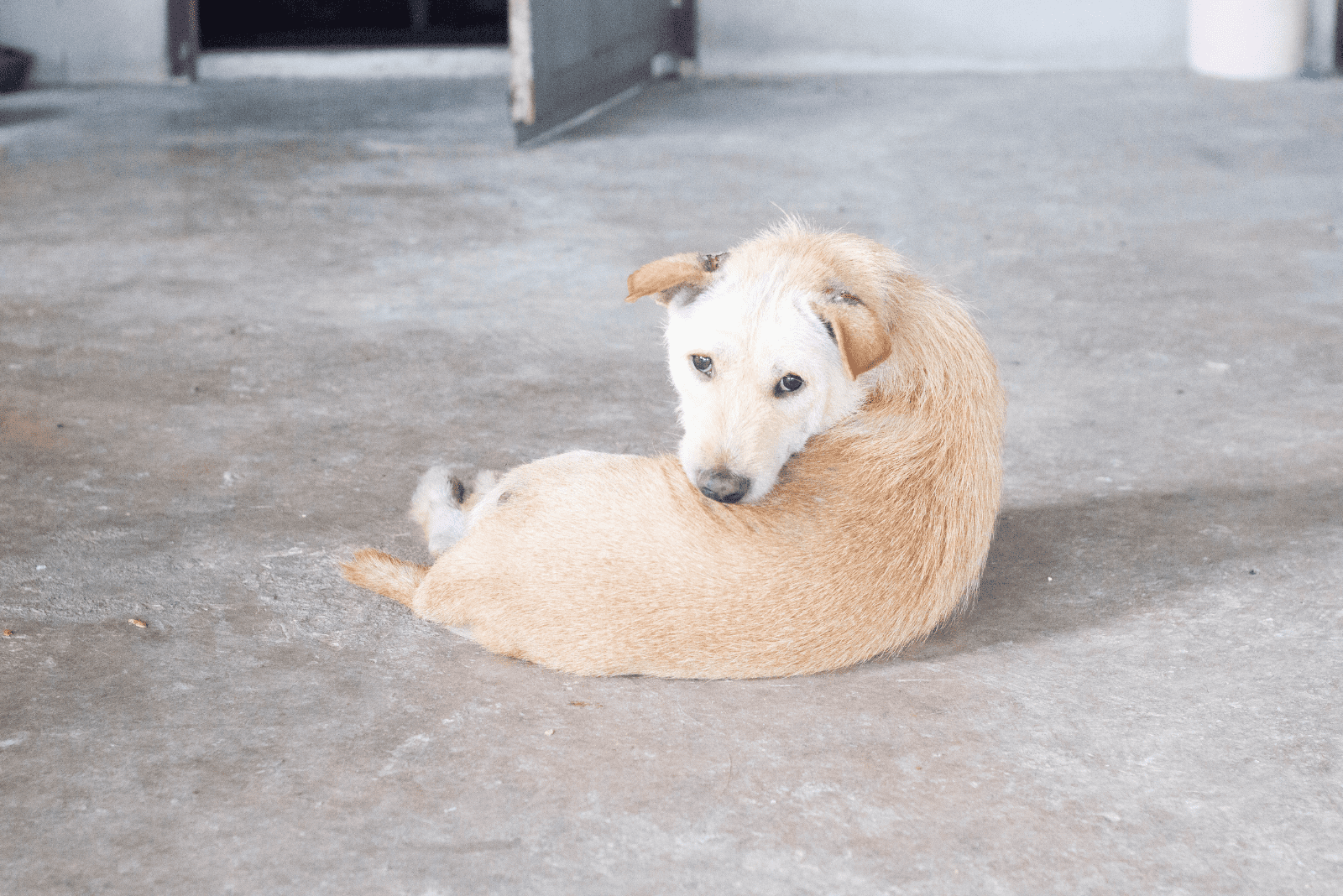Dogs are creatures of habit, just like us. When they realize that they have an open wound somewhere on their body, dogs rush to lick it in hopes of soothing the pain.
Not only does a dog licking a wound address cleaning the affected area, but it is also believed that it has antibacterial properties. But, the whole dog licking wound story is quite debatable because we are not so sure that a dog’s tongue and dog saliva have such antimicrobial and antiseptic properties.
In fact, when dogs lick their wounds they can make matters even worse. That’s why E-collars exist, right?
So, there must be a reason why a dog licking wound is considered unsafe. Many sources say that a dog licking your face is healthy and clean, but we beg to differ.
A dog’s mouth is far away from being clean and sterile. But, in contrast to human saliva, dog saliva has some special properties that we are excited to share with you.
Let’s see how (or if) it works in the wound healing process.
Does A Dog Licking Wound Help It Heal Faster?

Excessive licking of scrapes, minor wounds, or surgical wounds does not help in their recovery. I’d say that it does more damage than good because when dogs lick their wounds they keep the area moist all of the time and wounds do not have enough space to heal properly.
Moreover, such a moist environment that is combined with blood, lymph, and puss is absolutely perfect for all sorts of bacteria to breed and populate.
And trust me, your dog’s mouth is full of those bacteria that patiently wait for the perfect opportunity to colonize an open wound. If your dog has crusty scabs around its mouth, the bacteria on those can easily transfer to the open wound.
Additionally, moist wounds are at a higher risk of reopening and causing more trouble than you have anticipated.
Can A Dog Infect A Wound By Licking It?
Unfortunately, a dog can infect a wound by licking it, especially if it has an inflammation process somewhere in its mouth.
For example, dogs with stomatitis and gingivitis have higher chances of infecting an open wound by licking it. Of course, excessive licking can contribute to open wound infection.
Another thing to have in mind is when your dog is recovering from surgery — be it neutering, spaying, or something else — it has sutures that promote healing of the wound. The sutures are there to keep the wound in place and prevent ripping and tearing.
Post-surgical sutures assure that the wound edges heal properly and leave a minor scar. When dogs lick their incision site, chances are that they are going to rip the sutures. This is because dogs usually chew on their wounds while licking them.
So, if you have a female dog that is recovering from a spaying procedure and she excessively licks her spay incision site, it will get infected and the healing process is going to slow down drastically. If you thought that surgery was a problem, an infected dog incision site may be worse.
Why Do Dogs Like To Lick Open Wounds?
Even though dogs like to roll on dead stuff and eat cat poop, they still want to feel clean. Licking open wounds helps the dog get rid of dry blood and debris, and it also cleans the hair around it.
If the wound is bleeding, the dog’s hair around it is going to be dry and sticky, and it may even interfere with the healing process.
It’s not that they “like” to lick open wounds, it is their instinct and a way of cleaning and healing.
Dog licking wounds also has psychological benefits because their brain releases the good stuff (serotonin) which makes the wound healing process less painful. In fact, dogs lick their wounds just like humans put their hands on a wound or on a painful area of the body.
Is It Bad For A Dog To Lick A Wound?

Well, we can not say that it is bad because dogs inherited wound-licking behavior and it has its benefits. What is bad is excessive licking which can lead to self-mutilation.
Now, that’s very bad, and trust me, there is a thin line between excessive licking and self-mutilation in canines. That’s what is bad!
Let’s name some examples. If your dog has a minor wound, a small scrape, or perhaps its nail is separated from its quick and is causing the dog pain and discomfort, it will lick it a few times per day. That’s okay, as long as it is not overdoing it.
If you notice that your dog is licking its wound all of the time, and also chewing on it, then it is time to think about getting an Elizabethan collar. You know, the plastic cone that makes dogs look silly, but it is very effective in preventing wound infection and promoting healing.
You also have to pay attention if your dog is licking his butt and then licking his wound right after. Dog poop is not clean at all and a lot of dangerous bacteria such as E. Coli can be transferred from dog poop to the open wound.
Does A Dog’s Saliva Have Healing Properties?
Finally for the fun part —- does a dog’s saliva actually have healing properties? Does my dog’s saliva promote the healing of open wounds and scrapes? Why do dogs lick their wounds? What does a dog’s saliva do to a wound?
To answer all of these questions properly, it is best to take each compound that is found in dog’s saliva and describe it separately.
Opiorphin In Dog’s Saliva
Opiorphin is also found in human saliva and it is a complex chemical compound that acts as a pain reliever. So, when we say that dogs lick their wounds to ease their pain, we might as well thank the opiorphin compound.
Thanks to this interesting chemical compound, we can say that a dog’s saliva is a natural painkiller, but so is human saliva.
Mind you, it does not work instantly, nor does it have a numbing effect like some topical painkillers (lidocaine), but it does have a mild numbing effect.
If you are wondering how long your dog is going to be in pain after neutering, remember that its saliva may contribute to easing the pain from the surgical incision site.
Nitric Oxide In Dog’s Saliva
Okay, we already named a natural painkiller substance within the dog’s saliva. Now, it is time to say a few words about an antimicrobial substance that is called nitric oxide (nitrate compound).
The main task of nitric oxide in a dog’s saliva is to inhibit bacterial growth thus preventing the wound from becoming infected. Even though nitric oxide has antibacterial properties, it will not heal your dog’s wound nor will it necessarily aid in making the healing process faster.
In addition to its antibacterial properties, nitric oxide aids in the dilatation of blood vessels which aids in normalizing the blood flow around the wound.
Enzymes In Dog’s Saliva
Unlike human saliva, a dog’s saliva does not have digestive enzymes that help in breaking down food. The enzyme that is lacking in dog saliva is amylase, but they don’t really need it.
Humans chew their food and get it all wet with their saliva which aids in better digestion. In contrast to that, dogs don’t have to mix their food with saliva. Most of you have probably noticed that dogs munch down food without even chewing it properly.
However, dog saliva does have enzymes (acid phosphatase, non‐specific esterase, and pseudo‐cholinesterase) that do a great job of breaking down bacterial cell walls. Which means that they have antimicrobial properties.
Protease Inhibitors
Protease inhibitors in dog saliva are chemical compounds that prevent a certain enzyme from breaking down proteins. These inhibitors prevent bacterial growth and help promote healing.
Research shows that protease inhibitors have a huge role in the wound healing process.
Growth Factors
Growth factors in dog saliva aid in renewing the epithelial tissue which means that they help speed up the wound healing process.
Because of these growth factors, researchers call dogs’ saliva “the fountain of youth”. But, it is just a figure of speech — a dog’s saliva won’t make you younger!
Will A Dog Lick A Wound That Is Not On Its Body?

If you pay close attention to your dog’s behavior, you can see that there is a lot of licking included. Dogs like to lick each other’s ears, snouts, tails, butts, and so on. Some of them also like to lick other dogs’ pee! But, they also lick each other’s wounds.
Taking into consideration that you are a part of the pack, your dog sees you as a fellow companion. That said, your dog licks you and licks your hands to show affection, care, and devotion.
If it notices that you have a wound somewhere on your body, chances are that your dog will feel the need to lick it in order to clean it and relieve you from some of the pain. That’s cute, isn’t it?
In addition to licking its own wounds, a dog will lick other dogs’ wounds or yours too!
What To Do If A Dog Licks A Wound?
If a dog licks your wound or a small scrape, just wash it off with some soap and water. If your dog licks its wound, be it a surgical wound or a minor wound, you don’t have to worry straight away.
Your dog will lick its wound right after it wakes up from anesthesia. It is no biggie if your dog licks its wound a couple of times, but keep in mind that excessive licking is a no-go.
To keep your dog’s tongue from getting in its wounds, here are a couple of tricks I learned that work wonders:
Use A T-Shirt
Find a worn-out T-shirt and use it to make a physical barrier between your dog’s tongue and its wound. Wrapping a cotton T-shirt around the wound (if possible) is going to prevent your dog from licking it.
However, your dog might feel uneasy with that piece of cloth stuck on its wound, so it may feel the need to chew on it which increases the risk of the wound reopening.
The Cone Of Shame
Using an E-collar works wonders in preventing your dog from licking its wound. The cone of shame may look silly, but it is very effective.
If you are a worried pet owner who is wondering when to take the cone off of a neutered dog, pay attention to how its wound is healing and keep an eye out for any infections. Typically, dogs wear E-collars for a week, depending on the procedure.
Buy A Recovery Suit
A canine recovery suit is nothing more than a onesie that serves to protect your dog’s wounds and incision site from excessive licking, as well as from other impurities that the wound can get in contact with.
Before getting a recovery suit, make sure to ask your vet for advice.
Use Anti-Lick Strips
Anti-lick strips work as bandages but are not as successful as recovery suits and E-collars. Additionally, pet owners can’t apply anti-lick strips straight on the open wound.
They are good for minor scrapes and cuts.
Final Thoughts
Some believe that a dog licking wound has many benefits for faster healing, and there is an explanation behind this because a dog’s saliva does have some chemical compounds that are considered beneficial for any type of open wound.
However, the pros outweigh the cons — a dog licking its wound will not help it heal faster.
If your dog is recovering from surgery and has a fresh wound that is beginning to heal, it is best to prevent your dog from licking that wound.
In case you notice your dog licking wounds of other pets, you should stop him. Licking wounds constantly won’t do your dog, or your other pets any good.
Related Content
Why Do Dogs Arch Their Backs? 11 Reasons
